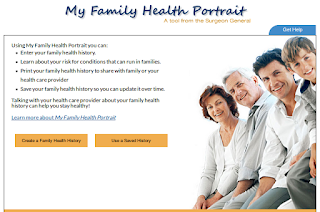Note: This is an updated version of my yearly post on National Family History Day.
#13,686
Every year since 2004 the Surgeon General of the United States has declared Thanksgiving – a day when families traditionally gather together - as National Family History Day, since it provides an excellent opportunity to ask about and document the medical history of relatives.
The CDC and the HHS have (updated link) web page devoted to assembling your family history, including a web-based tool to help you collect, display, and print out your family’s health history.
Surgeon General's Family Health History InitiativeUsing these online tools, you can create a basic family medical history with relative ease. For those leery of using such forms, you can simply use them as a guide for creating your own.
But before you can do this, you’ll need to discuss each family member’s medial history. The HHS has some advice on how to prepare for that talk:
Before You Start Your Family Health History
Americans know that family history is important to health. A recent survey found that 96 percent of Americans believe that knowing their family history is important. Yet, the same survey found that only one-third of Americans have ever tried to gather and write down their family's health history.
Here are some tips to help you being to gather information:
As a former paramedic, I am keenly aware of how important it is for everyone to know their personal and family medical history. Every day emergency room doctors are faced with patients unable to remember or relay their health history, current medications, or even drug allergies during a medical crisis.
And that can delay and even imperil both diagnosis and treatment.Which is why I always keep an EMERGENCY MEDICAL HISTORY CARD – filled out and frequently updated – in my wallet, and have urged (and have helped) others in my family to do the same.
I addressed this issue at some length in a blog called Those Who Forget Their History . . . . A few excerpts (but follow the link to read the whole thing):
Since you can’t always know, in advance when you might need medical care it is important to carry with you some kind of medical history at all times. It can tell doctors important information about your history, medications, and allergies when you can’t.
Many hospitals and pharmacies provide – either free, or for a very nominal sum – folding wallet medical history forms with a plastic sleeve to protect them. Alternatively, there are templates available online.
I’ve scanned the one offered by one of our local hospitals below. It is rudimentary, but covers the basics.
And a couple of other items that, while not exactly a medical history, may merit discussion in your family as it has recently in mine (see His Bags Are Packed, He’s Ready To Go)..
- First, all adults should consider having a Living Will that specifies what types of medical treatment you desire should you become incapacitated.
- You may also wish to consider assigning someone as your Health Care Proxy, who can make decisions regarding your treatment should you be unable to do so for yourself.
- Elderly family members with chronic health problems, or those with terminal illnesses, may even desire a home DNR (Do Not Resuscitate) Order.
While admittedly, not the cheeriest topic of conversation in the world, a few minutes spent during this Thanksgiving holiday putting together medical histories could spare you and your family a great deal of anguish down the road.

